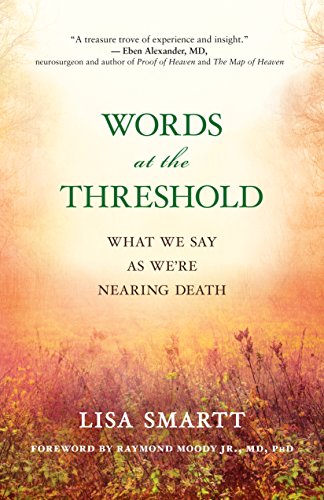Lisa Smartt’s book Words at the Threshold: What We Say as We’re Nearing Death, provides insight into our final conversations and language as we approach death. She suggests we be a student of the seemingly nonsensical language of the beloved, and listen for meaningful symbols and metaphor. What does not make sense at the time we are nearing death or seeing others nearing death may turn out later to reveal hints of prophecy or answers to questions.

Nearing Death Language
After collecting extensive accounts of things said during the last few hours of life, Smartt, author of this captivating book, found that language changes as we approach the threshold and are nearing death. How to describe the experience of dying? Travel metaphors speak of a coming voyage, where death is described as a voyage of exploration and discovery rather than defeat on the battleground of life. The life journey is reviewed, and important life lessons are recalled.
The whole perspective at the summit of the mountain is seen with greater love and understanding, and suddenly the odyssey makes sense. Final exclamations speak not only of departing, but arriving, boarding a train or a bus for a new destination. Do we use the journey metaphor because there are no literal words to describe the passage we are making?
 Language is intensified, and the dying seek completion. There is meaning in their unintelligible utterings. Descriptions of visions and visitations help the dying understand the mechanics of it. There are references to angels and religious figures, music, bells, and chimes, as well as to life being an illusion, a big hoax.
Language is intensified, and the dying seek completion. There is meaning in their unintelligible utterings. Descriptions of visions and visitations help the dying understand the mechanics of it. There are references to angels and religious figures, music, bells, and chimes, as well as to life being an illusion, a big hoax.
Her chapter “I’ll Call You When I Get There”, describes after death communication, including premonitions of death and nearing death, saying goodbye in dreams, bargaining with death and how the deceased can communicate to the living through technology and synchronicities in nature.
The uniqueness of the book is how she has systematically studied end-of-life communication by using examples from ordinary people. As her father neared his own death, she observed how despite the fact that he was always a skeptical man with a secular worldview, developed a deeply spiritual outlook in his final days — a change reflected in his language. The words he spoke. Visions he saw.
Just as Stephen Jenkinson (aka the Angel of Death, who helps people die “wise” in a human and sane way) argued in his talk at SAND this year, we need to help people die better. He argued that our culture embraces the opposite and finds it astonishing how often we avoid the word death even when it is fast approaching. Language is powerful and we shouldn’t be afraid of it.
On Smartt’s deep exploration of other people’s experiences, she captured what their loved ones said nearing death. Throughout the process, she collected more than one hundred case studies through interviews and transcripts. The language of the dying can point the way to a transcendent world beyond our own.
As you begin to listen to the language of people nearing death, you may not only change the way you think about dying, but it may very well transform how you think about living. After experiencing her father’s death in such vivid details (especially around his language), she wondered if the continuum was common to us and in any way tracked the path of consciousness as we die. Often, the language we hear as our loved ones are preparing to die are often overlooked especially if its meaningless to family members or healthcare providers.
Some of what she covers is unintelligible language (to us in the human/earth realm), however as it emerges towards the end of life, it can truly be transformative when we pay attention.
Her hope with this book was to inspire us to see how language at the end of life is more than simply a “word salad.” The stories of those who have gone through near death experiences tell us that life is a journey in which our primary mission is to learn love. Get this great read over on Amazon.
Be sure to read our other sections on spirituality, including spiritual events, spiritual health, spiritual products, spiritual reads (great books on spirituality), spiritual trips and spiritual voices which are our experiences with spiritual healers, practitioners, authors, teachers and gurus.